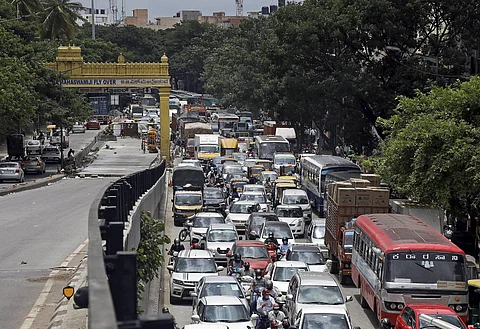

The Karnataka government’s suggestion of a congestion tax on motorists using the most congested roads of Bengaluru during peak hours has been met with reproval from many citizens. A report released earlier on September 22, jointly prepared by the Planning, Programme Monitoring, and Statistics Department of the Karnataka government and the Federation of Indian Chambers of Commerce and Industry (FICCI), had proposed a congestion tax on private vehicles accessing nine heavily congested roads in Bengaluru during peak hours.
A congestion tax is a fee that drivers must pay when entering specific parts of a city during peak traffic times. This fee is meant to alleviate traffic congestion in targeted areas. Numerous cities worldwide, including Singapore, London, and Stockholm, have already introduced congestion taxes. The proposed high-density corridors for implementing the congestion tax in Bengaluru are – Bellary Road, Tumkur Road, Magadi Road, Mysuru Road, Kanakapura Road, Bannerghatta Road, Hosur Road, Old Madras Road, and Old Airport Road.
The experts behind the Karnataka government’s report warned that introducing such a tax, without simultaneously enhancing public transportation in the city, could trigger massive negative reactions – and they have been proven right, with Bengalureans already up in arms against the move.
Residents took to social media as soon as media reports of the possibility of a congestion tax emerged, complaining that they were forced to use personal vehicles due to insufficient public transport facilities, and that bad road infrastructure added to the congestion. “Like many of our policies, this is another half-baked idea. Congestion tax makes sense when there are end-to-end alternatives available and nudge people to use public transport, instead of own vehicles - not when metro doesn’t even cover 10% of Bengaluru,” a user said on X, formerly Twitter.
The joint report of the Planning, Programme Monitoring, and Statistics Department of the state government and the FICCI, titled ‘Karnataka’s Decade - Roadmap to $1 Trillion’, which was released on September 22, said that traffic congestion in Bengaluru could potentially deter investors, making it a significant concern for the government. The primary objective of the congestion tax is to raise awareness among road users regarding the costs they impose on each other during peak hours.
According to the report, Bengaluru has approximately 12 million vehicles entering the city daily, causing around 1.2 crore citizens to lose 60 crore person-hours annually, along with nearly 2.8 lakh litres of fuel per hour, due to traffic congestion. The report suggests that the revenue generated from the congestion tax could be utilised to enhance public transportation services.
To streamline the collection of the congestion tax, the report proposes utilising the existing FASTag system, which has been operational in the city since 2021. “Levying a congestion charge could translate into significant revenue for the city. FASTag has been successfully deployed in the city since 2021. It is proposed that the same mode be used to collect congestion charges in the city for ease and convenience,” the report said.
Another recent report that was released in August said that Bengaluru incurred an annual loss of nearly Rs 20,000 crore due to traffic congestion on its roads. This loss of Rs 19,725 crore per year was attributed to traffic delays, congestion, signal stoppages, time wastage, fuel consumption, and related factors, as indicated by the study conducted by traffic expert MN Sreehari.
The Karnataka government had also recently said that carpooling in Bengaluru would be banned and defaulters would incur a penalty of Rs 5,000 to Rs 10,000. However, after much backlash, Transport Minister Ramalinga Reddy soon clarified that while carpooling was not banned, carpool service providers would need to get the necessary licences to operate in the city.